The oilfield and petrochemical industries run some of the most demanding systems in the world.
Pumps, compressors, valves, and drilling equipment must work under high pressure, heat, and corrosive fluids.
A failure in sealing systems can lead to downtime, safety risks, and financial loss. This is why many companies choose tungsten carbide seal rings.
This article explains how tungsten carbide seal rings perform in oilfield and petrochemical applications, their unique properties, and why they are the best option for long-term reliability and cost savings.
Why Seal Rings Matter in Oilfield and Petrochemical Equipment
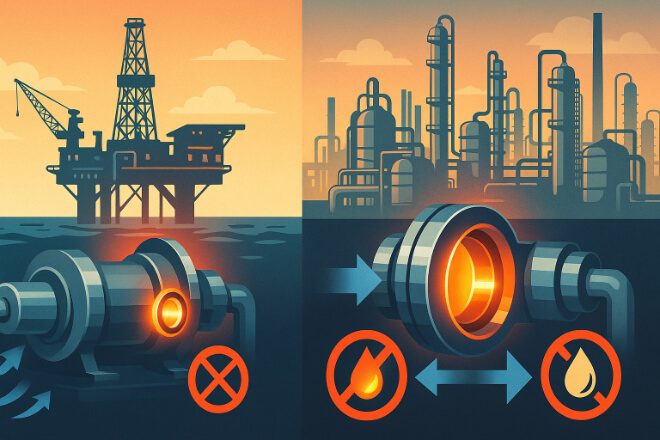
Seal rings are critical in protecting equipment against:
Leakage of oil, gas, or chemicals
Erosion from abrasive particles
Thermal stress from high temperatures
Mechanical shock from sudden pressure changes
A strong, durable seal material ensures safety, compliance, and efficiency in these harsh environments.
Properties of Tungsten Carbide Seal Rings
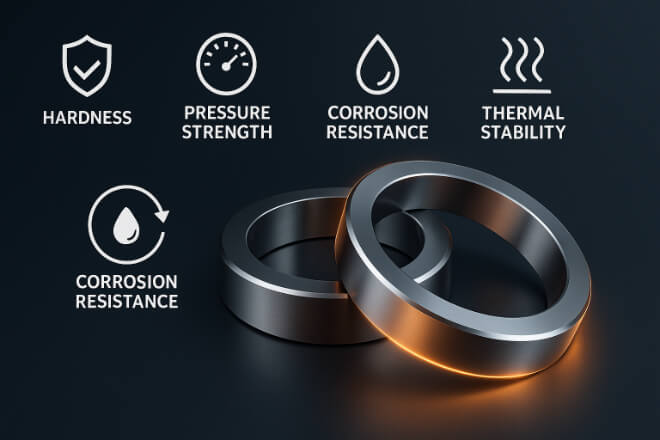
Tungsten carbide is a material created by combining tungsten and carbon, bonded with cobalt or nickel. Its main properties include:
Extreme hardness – Prevents wear from friction and abrasives.
High compressive strength – Withstands heavy pressure loads.
Thermal stability – Works reliably in hot oil and gas systems.
Corrosion resistance – Resists hydrocarbons, seawater, and chemicals.
Long service life – Reduces replacement frequency.
These features make tungsten carbide the preferred sealing material in drilling rigs, refineries, and petrochemical plants.
Cobalt-Bonded vs Nickel-Bonded Tungsten Carbide
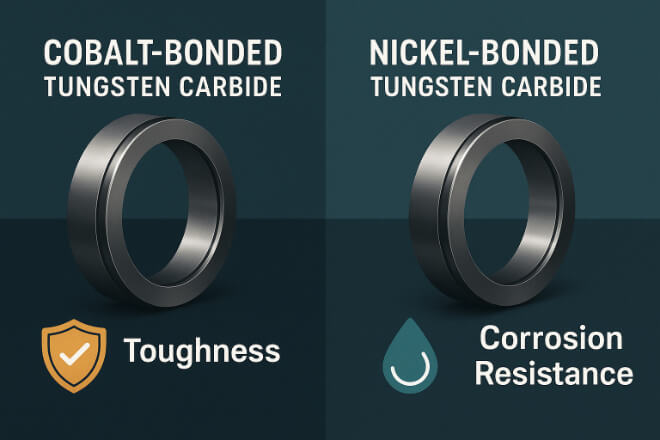
Binder choice affects performance:
1). Cobalt-bonded tungsten carbide
High toughness, good for vibration and shock.
Best in oilfield compressors and drilling pumps.
Moderate corrosion resistance.
2). Nickel-bonded tungsten carbide
Excellent resistance to corrosive chemicals.
Best for refineries and petrochemical plants.
Slightly less tough than cobalt-bonded.
Decision-makers must match the grade to the specific operating environment.
Performance in Oilfield Applications
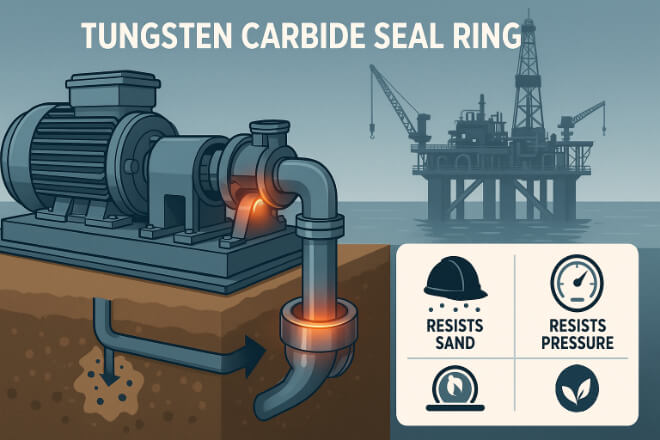
In oilfield operations, seal rings face:
High-pressure crude oil and gas
Sand and abrasive particles in drilling fluids
Extreme temperature changes
Protect pumps and compressors from wear.
Prevent leakage that could cause safety issues.
Extend service life in drilling and production systems.
Performance in Petrochemical Applications
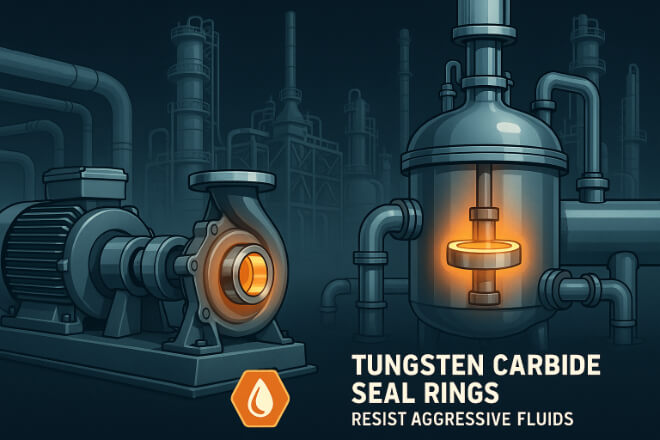
In petrochemical plants, seals face aggressive chemical exposure. Tungsten carbide seal rings:
Provide resistance against solvents, acids, and alkalis.
Work reliably in refinery pumps and chemical reactors.
Reduce downtime by lasting longer under corrosive conditions.
This makes them essential in facilities where chemical resistance is critical.
Comparison with Other Seal Materials
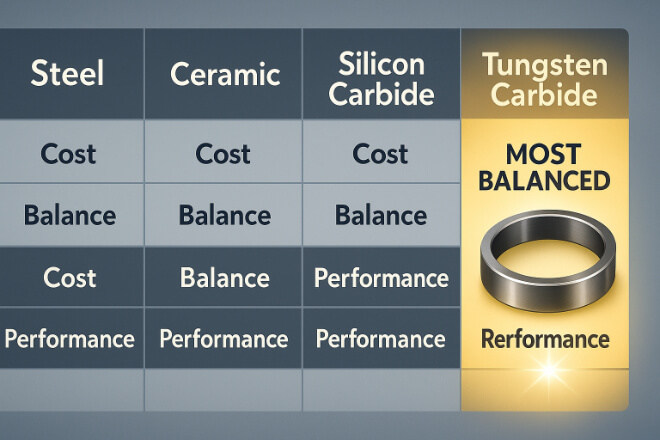
Steel seals – Cheap but corrode quickly in oil and chemicals.
Ceramic seals – Chemically resistant but brittle under shock.
Silicon carbide – Strong against chemicals but less tough under impact.
Tungsten carbide – Best balance of strength, toughness, and chemical resistance.
Cost vs Long-Term Value
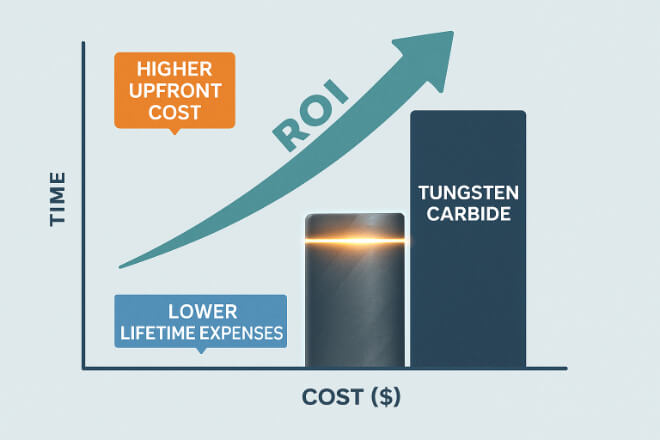
Although tungsten carbide seal rings have a higher initial cost, their life cycle benefits outweigh the price:
Fewer replacements → Lower spare part costs.
Less downtime → Higher productivity.
Longer pump life → Reduced equipment damage.
Better ROI → Strong financial case for decision-makers.
Best Practices for Using Tungsten Carbide Seal Rings
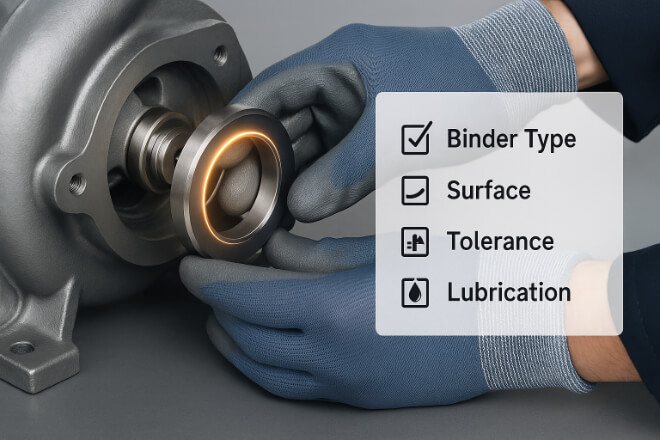
To ensure maximum performance in oilfield and petrochemical systems:
Choose the right grade → Nickel for corrosion, cobalt for shock.
Install carefully → Avoid scratches that weaken chemical resistance.
Inspect regularly → Catch early signs of wear or corrosion.
Maintain lubrication → Reduces heat and friction damage.
Sustainability and Recycling
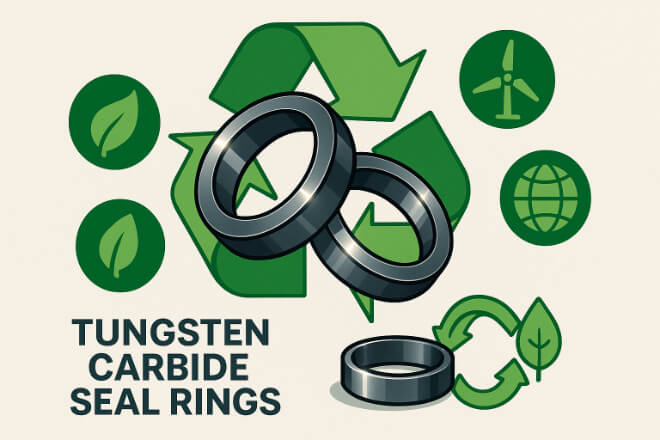
Tungsten carbide seal rings are recyclable. Many suppliers reclaim used rings and process them into new products.
This reduces waste and supports environmental goals, which is increasingly important in oil and petrochemical industries.
Key Takeaways for Decision-Makers

Tungsten carbide seal rings are best for oilfield and petrochemical equipment.
They resist wear, pressure, heat, and corrosion.
Cobalt-bonded grades suit heavy loads and shock.
Nickel-bonded grades suit chemical-rich environments.
Higher upfront cost is offset by longer service life and fewer failures.
Conclusion
For oilfield and petrochemical applications, tungsten carbide seal rings are the most reliable choice. They handle harsh conditions, corrosive fluids, and heavy loads better than most alternatives.
For decision-makers, investing in tungsten carbide seal rings means safer operations, less downtime, and stronger long-term value.
If you want to know more details about any company, please feel free to contact us.
